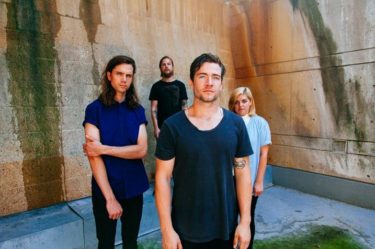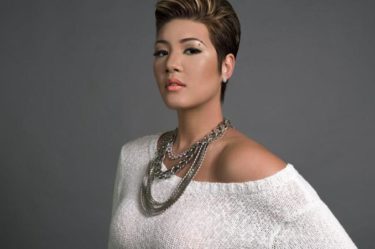Interview: Jonathan Jackson
When you hear the name Jonathan Jackson, you may think of the beloved Lucky Spencer, a character who grew up before our eyes on the soap opera General Hospital. Or you might think of Avery Barkley, the musician/producer he played on the television show Nashville. But the accomplished actor is also a skilled musician. Want proof? Check out his Grand Ole Opry rendition of “Unchained Melody,” which blew up on YouTube with over 3 million views.
For nearly 15 years, Jackson has served as singer, guitarist and songwriter for the alternative rock band Jonathan Jackson + Enation, which also includes his brother Richard Lee Jackson on drums and Daniel Sweatt on bass. With their 2016 EP, Blame-shifter, the group covers a wide range by contrasting delicate, thought-provoking, piano-driven songs with tracks built around memorable guitar riffs and thundering drums. The 6-song EP is an appropriate preview of what’s to come on their next full-length release.
Jackson spoke with Songfacts on Enation’s EP release day, which was the day after the announcement that Nashville would not be returning for a fifth season (it was later picked up by CMT). He talked about songwriting, the actor-musician stigma, and how he feels about the show coming to an end.
Laura Antonelli (Songfacts): When you’re writing a song, what process results in the best outcome for you?
Jonathan Jackson: It really changes all of the time. It depends on what kind of song it is and what’s the initial inspiration for it. Sometimes it’s a musical beginning when at the piano or on the guitar and something starts to come out. It begins with the lyrics and a title of a song or something like that, and then oftentimes, it will take me a long time to find the right music to fit the lyrics.
And then sometimes it happens all at once where you sit down and the lyrics and the music just come out. So there definitely isn’t one way that it happens – there are a lot of different things that take place.
Songfacts: You’re also an established actor and you’ve said that sometimes you’ll write in the headspace of the character you’re playing. Can you think of specific songs when that has happened and do you ever create your own characters as well?
Jonathan: Yeah, absolutely. That’s a great question. Over the years it’s been a lot of different songs. There’s a song I wrote years ago called “Haze” and another one called “Nothing” that was inspired by when I played a heroin addict in an ABC movie when I was 17 years old, and those songs came out of that experience.
I wrote a song when I was a teenager when I did The Deep End of the Ocean. The Stephen King movie, Riding the Bullet, our song called “Ride” was written really from what that character was going through. My character on General Hospital, I’ve written songs that came out of the struggles that character was going through.
Other songs are characters almost like writing a book or movie. Some of it is autobiographical and some of it is more telling a story from someone else’s perspective. It’s healthy for me to do that because, oftentimes, it can become too narcissistic if I’m trying to express myself all of the time. My problems are what I’m going through and sometimes it’s nice to take a step back and feel what someone else is going through and that can help.
Songfacts: Let’s talk about Enation’s new EP, Blame-shifter. The title comes from the second song that was inspired by a book you read. What was the book and why did you connect with its message so much?
Jonathan: The book is called St. Silouan the Athonite. It’s an incredible book. It was written about a Monk and his life. He was just a humble man and he spoke a lot about how important it is not to push blame onto others – what we go through in life and be able to take blame for ourselves in almost a cosmic way. You get the picture of it, but it really inspired me, and that’s where that song came from.
Songfacts: “Ascending” is musically aggressive but in the lyrics the narrator seems to be protecting a loved one. How did that one come to be and what’s the story happening in it?
Jonathan: Yeah, that one was pretty autobiographical. It was written for my wife. It’s really a song about chivalry. When you get married, you have this sense of protection and you want to offer that protection and say that all of these other forces out there, they don’t have access to you anymore. They’re going to have to come through me first, so that is really where it came from.
I had that song around for quite a few years before the chorus actually came into play. The chorus, “Your beauty is ascending, you’re something worth defending,” was something that came quite a bit later. But we wanted it to be a three-and-a-half minute rock song with a lot of lyrics. Like you said, something that was musically aggressive but lyrically was really about beauty and the struggle of beauty. It says – I can’t remember the beginning, only the second verse but, “wolves are always stalking, beauty is a curse, innocence makes you a target.” It talks about how beauty is wonderful, but, at the same time, it also can be quite difficult because there are a lot of wolves out there and life can be tricky.
Songfacts: You described “Alleluia” as “a street hymn.” Can you expand on that thought and your intent for that song?
Jonathan: It’s a street hymn in the sense that it’s all about culture. So with a title like “Alleluia,” it’s obviously in the tradition of Leonard Cohen’s “Hallelujah” and songs like that where it has a spiritual undertone and it’s using religious imagery, but it’s also religious imagery that’s connected with the culture. “I am the pop star lost by design” – lyrics like that where it’s then adding an “amen” after.
It’s almost a juxtaposition of the prayers of the world and the prayers of the culture and how we sometimes put an “amen” after crazy things. So it’s really just that tension between madness and simplicity.
Songfacts: What motivated you to write “Let the Beauty Out”?
Jonathan: A few things. Some friends that I was close to were struggling and going through a tough time, so for me it was a song for them. It was a song in essence saying, “Don’t give up.”
It’s all desperation:
Crawl on your broken floor
Scratch your nails on the door
Love like you’ve got nothing to lose
Like your soul’s never been bruised
Cry until the tears start to cleanse
It’s just saying, “Don’t give up. Don’t give up. Don’t give up. Let the beauty out.”
There’s beauty on the other side of this tension and this difficulty, so that’s where that one came from.
Songfacts: How did you come up with the idea for “Wasteland” and what’s the tale occurring in it?
Jonathan: “Wasteland” just kind of happened. Lyrically, I didn’t know the intent of the song as the lyrics came out. It was all written and I didn’t really understand quite what it was at first. I realized afterwards that it was in essence the prodigal son. Prodigal means to be wasteful, and so that’s where that came from. It starts out, “I ran away from my father’s house and I saw some things I was not prepared.”
The imagery at the end is kind of a reunion, but it’s left for the listener to experience it. It doesn’t fill in all the blanks. It just alludes to that moment of coming home.
I thought about that song afterward and to me it had some influences from Peter Gabriel. It reminded me of a little bit of his tone in his music for some reason. It’s almost like cinematic lullabies.
Songfacts: The EP ends with your performance of “Unchained Melody” from the Grand Ole Opry. What is it about that song that resonates with you so much?
Jonathan: Well, that song means a lot of things to a lot of different people. I think it’s probably one of the most-recorded songs ever. Musically, I connect it to my dad and Elvis. I grew up listening to my dad singing a lot of Elvis’ gospel music. It’s not really a gospel song but it’s in that sort of classical music tradition. The Opry is just such a beautiful environment to be able to perform songs like it, so I dedicated it to my wife that night. It’s just such a beautiful song.
We were shocked and surprised at the response it got when the Opry put it on YouTube. They had a lot of people sending in messages saying, “How can I download this song? How can I have this song?” So we thought, “Well, maybe let’s just put it on the EP?”
Because we’re in a moment where it’s an alt-rock EP, but it also has some of the more acoustic stuff like “Alleluia” and “Wasteland.” Some of the music that we’re making right now that’s going to come out possibly next year has a little bit more of that roots music feel going on there, so it just felt right and we wanted to make it available for people.
Songfacts: What are your thoughts on Nashville coming to an end and what have you learned from being on the show?
Jonathan: Well, obviously everybody wanted a fifth season. We were excited about the opportunity. But there’s been so much good that’s come from it. It’s been an incredible journey. We love living in Nashville. We’ve been here for four years and I’m grateful for it. I have three kids and they love it here.
All of the friends and everybody from the show that we’re close to… it’s a unique thing in the entertainment world to work with the same people for this long. A lot of times when you’re doing a film, you work with someone for a couple of months and you might not really see them again. So to be four years in the trenches with people is a beautiful thing. I have so much love and respect for each one of them. So, honestly, I just feel really grateful for the whole thing. It was just an incredible experience.
I’ve learned a lot musically being here working with T Bone Burnett, Buddy Miller, and Colin Linden. Some absolutely incredible musicians we’ve been on the road with, and just being inspired by all the songwriters that I’ve been able to meet and write with. It’s really been an incredible experience.
Songfacts: There can sometimes be a stigma toward actors who have music careers and vice versa. Did you ever face any challenges within the music industry because you became well-known first for acting?
Jonathan: Oh, for sure. It’s a common thing. I probably have that same bias, to be honest [laughs]. It’s tough. If somebody’s been known as an actor in any capacity and you hear they do music, you don’t really assume that it’s going to be all that amazing.
It is a bias, but that’s fine. I mean, that’s just life. Everybody has their challenges and things to overcome. I’ve been doing it ever since I was eight or nine years old and playing in a band with Richard [his brother and Enation’s drummer] since we were teenagers, so it’s what we love to do.
I think Nashville in some ways helped bridge that gap to some extent because we’ve been out on tour with the show. People get to see that we’re actually performing this stuff and that part of it is not pretend. So we’re going to keep making music and keep plugging away. It’s just what we love to do.
Songfacts: Out of your whole discography, is there a song that the meaning of it has changed for you since you first wrote it?
Jonathan: Oh, that’s interesting. Wow. I’ll have to think about that. [Long pause] In some ways I feel like all of the songs have changed. Not really changed in sense of the opposite direction, but it’s almost like the colors have been filled in. When we sing a song that we’ve had for years, when you have more life behind you and more experiences, a lot of what’s in the song and the seeds that are in there, the personal connection is that much deeper. “Eyes of Grace” is definitely a song like that and we still play it live. “Everything Is Possible” is another one. You kind of inhabit the songs based on where you are in your life at that moment.
Sometimes I find I need to hear the song more now than I did when I wrote it in terms of if it’s a song that’s trying to overcome some kind of despondence or fear. Sometimes I need to hear it more now than when it was written, so it’s always moving. It’s why I love playing live: because it’s always a new moment.
Songfacts: What do you find is the most difficult aspect of writing a song?
Jonathan: Oh, boy, that’s a tough question, too. The challenges change depending on the song. There are some songs where the lyrics are really a challenge and then there are other songs where the lyrics are there and the music is a challenge. And then you’ve got rock songs where the challenge is the tightness of the arrangement with the band. The music and the lyrics are there, but it’s a challenge to get the arrangement correct. So I wouldn’t be able to point to one thing. What the challenge is changes all of the time.





3 Comments
This is a matter close to my heart cheers. Thanks
Hi there! This post could not be written any better!
Reading through this post reminds me of my previous room mate!
He consistently kept talking about this. I will forward this article to him.
Fairly confident he’ll have a good read. Thank you for sharing!
You should participate in a competition for one of the finest websites on the internet.
I’m going to recommend this site!